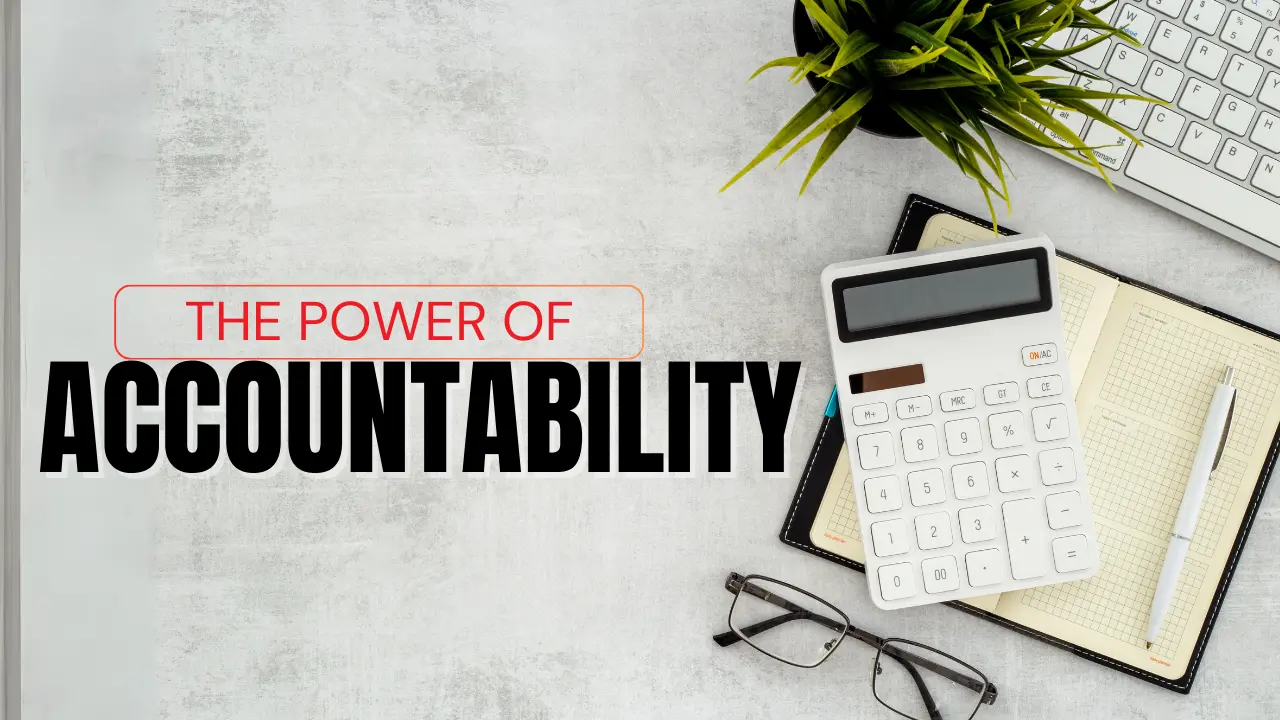In today’s fast-paced world, maintaining productivity can often seem like an elusive goal. Distractions are everywhere, and staying focused requires more than just willpower. This is where the power of accountability becomes invaluable. Accountability, combined with a robust support system, can transform the way we approach our goals and help us achieve success more effectively. Let’s dive into how accountability can supercharge your productivity and the best strategies to make it work for you.
What Is Accountability and Why Does It Matter?
Understanding Accountability
At its core, accountability is about taking responsibility for your actions, commitments, and progress. However, it becomes exponentially more impactful when shared with others. This concept, often referred to as the power of accountability, involves creating a support system where your goals and tasks are visible to someone who encourages and motivates you to stay on track.
For instance, think about how we perform better in school or at work when deadlines are monitored by teachers, bosses, or colleagues. This same principle applies to personal growth. When you share your goals, you naturally feel more driven to accomplish them.
Why Accountability Is Crucial for Productivity
Accountability isn’t just about reporting to others—it’s about creating a structure that fosters consistency and clarity. Studies reveal that individuals with accountability partners are 65% more likely to meet their goals. Whether you’re looking to excel professionally or adopt a new habit, having someone to hold you accountable can make all the difference.
The Power of Accountability in a Support System
Building the Right Support Network
The power of accountability is maximized when paired with a well-structured support system. Your support network could include a mentor, friend, family member, or even a peer group. The key is to choose individuals who genuinely care about your progress and are willing to help you stay committed.
Key Steps to Build a Support System (H3)
- Select Reliable People: Your accountability partners should be dependable, encouraging, and honest.
- Communicate Your Goals Clearly: Explain what you’re trying to achieve and how they can help.
- Set Regular Checkpoints: Agree on periodic updates to ensure consistent progress.
- Celebrate Milestones: Acknowledge achievements, big or small, to stay motivated.
The Role of Accountability in Achieving Goals
When you share your goals with others, you’re more likely to stick to them because you feel responsible not just to yourself but also to your accountability partner. For instance:
- If you’re pursuing fitness goals, having a gym buddy can keep you motivated.
- For professional objectives, reporting progress to a mentor ensures you stay focused.
- In relationships, accountability fosters mutual growth by encouraging open communication and shared commitment.
Practical Ways to Leverage Accountability

1. Partnering for Productivity
Having an accountability partner is one of the simplest ways to utilize the power of accountability. This partner could be a friend, colleague, or even a coach who regularly checks in on your progress.
How to Make It Effective (H3)
- Define clear, measurable objectives together.
- Set a consistent schedule for check-ins (daily, weekly, or biweekly).
- Provide and accept constructive feedback.
2. Leveraging Technology for Accountability
Modern technology offers powerful tools to help you stay accountable. From apps to project management platforms, these resources ensure that you remain on track.
Some popular tools include:
- Habitica: Gamifies habit-building and goal-setting.
- Trello: Helps organize and visualize tasks.
- Slack: Ideal for group accountability and collaboration.
By using these tools, you can track progress, set reminders, and share milestones with your support network.
Overcoming Challenges in Accountability
Despite its benefits, accountability isn’t without its challenges. However, understanding these barriers and addressing them proactively can ensure its effectiveness.
Challenge 1: Fear of Judgement
Many people hesitate to share their goals due to a fear of being judged. To overcome this, it’s crucial to choose a non-judgmental support system that fosters trust and positivity.
Challenge 2: Inconsistent Follow-Ups
Without regular follow-ups, accountability can lose its impact. Establishing a consistent check-in routine is essential to maintain momentum and address roadblocks.
Real-Life Examples of Accountability
In Professional Settings
In the workplace, the power of accountability is evident in team meetings, performance reviews, and project deadlines. For instance, project managers often rely on accountability frameworks to ensure tasks are completed on time.
In Personal Growth
On a personal level, accountability plays a significant role in habit formation. Whether it’s learning a new skill, adopting a healthy lifestyle, or managing finances, having someone to keep you accountable can accelerate progress.
The Long-Term Benefits of Accountability
While the power of accountability is often associated with productivity, its impact goes beyond immediate results. Accountability fosters:
- Self-Discipline: Regular check-ins build habits that lead to long-term success.
- Stronger Relationships: Sharing goals with others deepens trust and mutual understanding.
- Confidence: Achieving goals consistently boosts self-esteem and motivates you to aim higher.
Conclusion: Embrace the Power of Accountability
In conclusion, the power of accountability is a transformative tool that can help you stay productive and achieve your dreams. By building a reliable support system, leveraging technology, and addressing potential challenges, you can unlock new levels of success. Start today by identifying your goals, finding the right accountability partner, and committing to regular progress updates. Remember, accountability isn’t just a strategy—it’s the key to sustainable growth and achievement.
Also Read: When did humanity realize the risks of climate change?
FAQs About The Power of Accountability and Staying Productive with a Support System
The Power of Accountability is a widely recognized strategy for enhancing productivity and achieving goals. However, people often have questions about how it works and why it’s so effective. Here’s a comprehensive list of frequently asked questions (FAQs) to help you better understand the concept and its benefits.
1. What Is the Power of Accountability?
The Power of Accountability refers to the process of taking responsibility for your actions and goals while involving others to support, guide, or motivate you. This principle relies on external encouragement to help you stay consistent and productive, whether through a mentor, peer, or group.
2. How Does Accountability Improve Productivity?
Accountability keeps you focused, consistent, and motivated. When you know someone is monitoring your progress, you’re more likely to avoid procrastination and take proactive steps. Research shows that individuals with accountability partners achieve 65% more of their goals compared to those working alone.
3. Who Can Be My Accountability Partner?
Your accountability partner can be anyone who supports your goals, such as:
- A trusted friend or family member
- A mentor or coach
- A colleague or teammate
- A peer group with similar objectives
The key is to select someone reliable, honest, and supportive who will hold you accountable without being overly critical.
4. Can Technology Be Used to Create Accountability?
Yes, technology is a powerful tool for fostering accountability. Several apps and platforms are designed to track progress and keep you on track. Popular options include:
- Trello for task management and tracking deadlines.
- Habitica for gamifying habits and routines.
- Google Calendar for scheduling regular check-ins and reminders.
These tools make it easier to stay consistent and share progress with your support system.
5. What Are the Benefits of a Support System in Accountability?
A support system enhances the power of accountability by providing:
- Encouragement and motivation
- Constructive feedback to refine your approach
- Emotional support during challenges
- A sense of community, reducing feelings of isolation
By creating a circle of trust, your goals become more achievable.
6. How Can I Set Up Regular Check-Ins with My Accountability Partner?
Consistency is key when leveraging the power of accountability. To establish regular check-ins:
- Choose a schedule that works for both parties (e.g., weekly or monthly).
- Use digital tools like Zoom, WhatsApp, or emails for updates.
- Prepare reports or summaries to discuss during each check-in.
- Set goals for the next session to maintain momentum.
7. What Are the Challenges of Accountability, and How Can They Be Overcome?
While accountability is highly effective, it comes with potential challenges, such as:
- Fear of Judgment: Choose a non-judgmental partner who fosters trust.
- Inconsistent Follow-Ups: Set a clear structure and stick to it.
- Overdependence: Maintain a balance between external accountability and self-discipline.
By addressing these obstacles early, you can maximize the benefits of accountability.
8. Does Accountability Only Work for Professional Goals?
No, accountability is equally effective for personal goals. Whether you’re trying to build a new habit, improve relationships, or adopt a healthier lifestyle, a support system can help you stay consistent and motivated.
9. Can Group Accountability Be More Effective Than Individual Accountability?
Group accountability can be incredibly motivating, especially if you thrive in collaborative environments. Groups offer diverse perspectives, shared experiences, and a sense of camaraderie. However, individual accountability may be more effective for people who prefer personalized feedback and one-on-one guidance.
10. How Do Transition Words Help in Accountability Planning?
Transition words ensure smooth communication and clarity, making check-ins and reports more effective. For example:
- Words like however, therefore, and meanwhile can structure updates logically.
- First, then, and finally can outline progress clearly.
Using transition words keeps your communication professional and easy to follow.
11. What Are Some Real-Life Examples of Accountability?
Here are some scenarios where the power of accountability has been transformative:
- Fitness Goals: A gym buddy can help you stick to a workout routine.
- Career Growth: Regular feedback from a mentor accelerates professional development.
- Learning a Skill: Sharing progress with a peer group keeps you motivated to practice consistently.
12. How Can Accountability Foster Long-Term Success?
Accountability builds habits, reinforces discipline, and encourages growth over time. When you consistently meet your commitments, you develop a strong sense of self-worth and confidence. This foundation makes it easier to tackle future challenges.
13. Can Accountability Lead to Overcommitment?
While accountability encourages productivity, it’s essential to avoid overcommitting. To prevent burnout:
- Prioritize tasks based on importance and urgency.
- Be transparent with your partner or group about realistic timelines.
- Take breaks when necessary to recharge.
14. How Can Students Use the Power of Accountability?
Students can benefit greatly from accountability by:
- Joining study groups for collaborative learning.
- Setting goals with teachers or peers for consistent progress.
- Using apps to track assignments and deadlines.
This approach not only improves academic performance but also builds life skills like time management and teamwork.
15. How Does Accountability Differ from Responsibility?
While responsibility is internal and self-driven, accountability often involves external checks. Responsibility means owning your actions, while accountability ensures those actions are aligned with specific goals and commitments.
16. How Do Transition Words Enhance Communication in Accountability Check-Ins?
Transition words streamline communication by:
- Clarifying connections between ideas (e.g., “as a result,” “in contrast”).
- Structuring updates in a logical flow (e.g., “first,” “next,” “finally”).
- Ensuring clarity during discussions with partners or groups.
This ensures check-ins are productive and actionable.
17. How Can You Measure Accountability’s Impact on Productivity?
You can measure the impact of accountability through:
- Goal Achievement Rates: Compare success rates with and without accountability.
- Consistency in Progress: Track how often you meet deadlines.
- Qualitative Feedback: Gather insights from your accountability partner about noticeable improvements.
18. Can Accountability Help with Overcoming Procrastination?
Yes, accountability is a powerful antidote to procrastination. When someone else is monitoring your progress, the external pressure compels you to act, even when motivation is low. Regular check-ins create a sense of urgency and accountability that keeps you moving forward.
